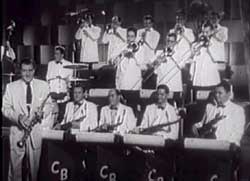 Charlie Barnet had pretty much retired from the music industry in 1949 & made no attempt to fight the changes that were occurring, making it increasingly difficult to support a big band.
Charlie Barnet had pretty much retired from the music industry in 1949 & made no attempt to fight the changes that were occurring, making it increasingly difficult to support a big band.
After retiring he would now & then get some of the band members back together for brief tours, though he was never again a full time bandleader or musician.
He did get the band back together for what was probably one day of work recording "telescriptions" in 1950, these being video disc-recordings to be played on early television as visual equivalents of record play on radio. These can be found on the compilation dvd Jazz Legends: The Big Bands Volume 2 (2001), together with Les Brown's Snader telescriptions & a some lesser things.
These are well done live recordings & the best way to see & hear the mature, immediate post-retirement days for Charlie Baret. He doesn't show the enthusiasm of his younger years but he's a consumate professional who assurely knows his stuff.
Skyliner (1950) is a Snader telescription for Charlie's brass & reed band, a typical Barnet composition he first recorded in 1944. He plays lead on small soprano sax for this pleasant if generic-for-its-era swing instrumental with a big sound.
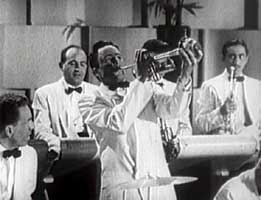 Halfway through Barnet puts down his soprano sax & grabs a larger tenor saxophone to showcase himself a second time. Halfway through Barnet puts down his soprano sax & grabs a larger tenor saxophone to showcase himself a second time.
The limelight's not shared much for this number, though the piano gets a solo while Barnet switches back to soprano sax for the close.
Andy Gibson's composition & arrangement of Andy's Boogie (1950) has Charlie Barnet firing up the band with their big brassy sound, soon leading to a muted trumpet solo.
Although Gibson was himself a good trumpeter, he wasn't in the band, he merely wrote & arranged for it, & I've no idea who this lead trumpet player is, but he's great.
The mute eventually comes out for a really bigger sound. Two-thirds of the way through Charlie takes over with his soprano sax. This had been a hit for the band in 1947.
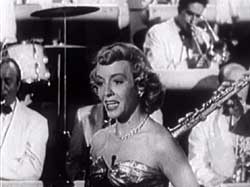 My Old Flame (1950) is a slow, romantic number beginning with Charlie on soprano sax. My Old Flame (1950) is a slow, romantic number beginning with Charlie on soprano sax.
Then Helen Carr strolls into the frame to sing the lyrics: "My old flame/ I can't even think of his name/ But it's funny now & then/ How my thoughts go flashing back again/ To my old flame..."
Spike Jones ruined this song for me as a serious swing number, & I can only think of it done with a Peter Lorre voice & hysterical sound effects. But Helen is so good she almost reclaims it.
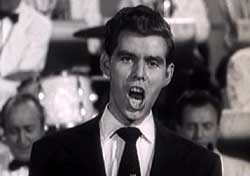 This, her final musical recording, is the only opportunity to see her perform on film. She had brief stints with a number of leading bands but seems to have been caught on film only for this telescription. This, her final musical recording, is the only opportunity to see her perform on film. She had brief stints with a number of leading bands but seems to have been caught on film only for this telescription.
She died young, in 1960, with sundry sources alleging she died in a car accident, or from breast cancer. Nearly all her recordings are gathered on Helen Carr: The Complete Bethelehem Collection (2001) & it's an impressive if very limited legacy.
For Caravan (1950), the vocalist is Bill Derry. Charlie Barnet is conducting with his fists, no sax this time, with a big Ellington tomtom beat throughout. Dick Kenney starts off the exotica instrumentation on valve trumbone.
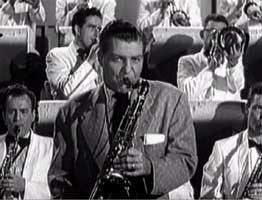 Out strolls Derry to the microphone to sing: "Niiiiiight. And stars above that shine so bright/ The mystery of their fading light/ That shines upon our caravan..." Out strolls Derry to the microphone to sing: "Niiiiiight. And stars above that shine so bright/ The mystery of their fading light/ That shines upon our caravan..."
This is a great, great song & Derry sings it fairly well if not quite beautifully. He's a weird looking s.o.b., scrawny with a thin-lipped big crooked mouth, but all the more intriguing a singer for not looking like he got his face on straight.
Beginning with a slight edge of exotica jazz & then bursting into a dance swing is Cherokee (1950) with Charlie having the majority of lead attention on his alto sax, with lots of brass backs him up. He switches to tenor sax with a strong tomtom & slap-bass percusion to help him close.
Because they're all filmed on the same set at the same time, the Snader Telescriptions taken as a group come off as a mini-concert of considerable quality.
copyright © by Paghat the Ratgirl
|
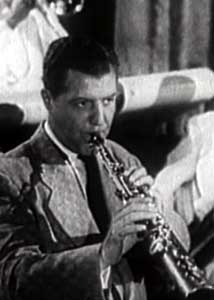

 Halfway through Barnet puts down his soprano sax & grabs a larger tenor saxophone to showcase himself a second time.
Halfway through Barnet puts down his soprano sax & grabs a larger tenor saxophone to showcase himself a second time.
 This, her final musical recording, is the only opportunity to see her perform on film. She had brief stints with a number of leading bands but seems to have been caught on film only for this telescription.
This, her final musical recording, is the only opportunity to see her perform on film. She had brief stints with a number of leading bands but seems to have been caught on film only for this telescription. Out strolls Derry to the microphone to sing: "Niiiiiight. And stars above that shine so bright/ The mystery of their fading light/ That shines upon our caravan..."
Out strolls Derry to the microphone to sing: "Niiiiiight. And stars above that shine so bright/ The mystery of their fading light/ That shines upon our caravan..."